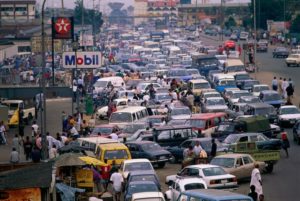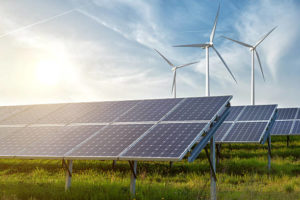Air Pollution
Air pollution is among the most important causes of premature deaths worldwide. Many drivers of bad air quality in emerging economies, including coal-fired power generation and transportation, also contribute to climate change. ISEP explores creative policy solutions to the problem of air pollution, with a particular emphasis on understanding public awareness of the problem and popular preferences for policy solutions. Our current work includes:
- In Vietnam, we currently explore public awareness of air pollution. Our goal is to describe the level of awareness, understand what drives it, and work with local partners to develop policy solutions to the problem.
- In China and India, our research focuses both on public awareness and the way mainstream media frames the air pollution issue. Here also we want to understand how awareness is created and popular preferences for different policy solutions.
Energy Subsidy Reform
 Many energy subsidies encourage the production and consumption of fossil fuels that damage the environment. What is more, these subsidies contribute to budget deficits in emerging economies and often fail to reach the poorest households. Motivated by these concerns, ISEP explores innovative approaches to energy subsidy reform. We are currently working on project such as:
Many energy subsidies encourage the production and consumption of fossil fuels that damage the environment. What is more, these subsidies contribute to budget deficits in emerging economies and often fail to reach the poorest households. Motivated by these concerns, ISEP explores innovative approaches to energy subsidy reform. We are currently working on project such as:
- In India, we collaborate with the Global Subsidies Initiative to understand people’s willingness to pay for improved electricity service. Our surveys and experiments seek to understand why Indian states face such difficulties in improving the quality of electricity distribution by allowing distribution companies to cover the real costs of the service.
- At the global level, we conduct research on patterns of fuel subsidy reform. Using data on energy prices across countries and over time, our goal is to understand when and how governments can reform their energy subsidy policies – and sustain those reforms over time.
Sustainable Energy in India

India is a perfect example of the sustainable energy challenge. On the one hand, rapid economic and population growth threaten global efforts to mitigate climate change. On the other hand, hundreds of millions live without access to electricity and clean cooking fuels.
Given the magnitude of this challenge, ISEP considers India a top priority. In collaboration with our core partner, the Council on Energy, Environment, and Water (CEEW) in New Delhi, we work on a wide range of projects on rural electrification, clean cooking fuels, coal, and renewable energy. With support from international and Indian agencies, and in continuous exchange with the central and state governments, we conduct top-notch research to inform and improve energy policy. Projects include:
- In collaboration with CEEW, the ISEP Founding Director supervised ACCESS, the largest energy access survey in the world. The dataset with 8,568 households from 714 villages in six states of India is fully documented and freely available for non-commercial uses. The collaboration also produced a video on India’s energy poverty problem. ISEP is currently preparing for the launch of ACCESS-2, a groundbreaking study that re-interviews the original ACCESS households to establish definite patterns of change in energy access in rural India.
- The ISEP team also conducted the first randomized controlled trial on the socio-economic benefits of solar micro-grids in rural India. The study was widely covered in international media, including The Economist, and triggered a major debate in the off-grid space.
Energy Access for India’s Largest State, Uttar Pradesh

Within India, the state of Uttar Pradesh is ground zero for energy access. With a population of 200 million people and a low level of human development, Uttar Pradesh faces difficult problems in rural electrification, electricity distribution, and the expansion of clean cooking fuels. For ISEP, the state is thus a natural priority. In close collaboration, with CEEW, ISEP is currently exploring innovative solutions to the problem of rural electrification and the poor technical and financial performance of electricity distribution companies. Projects include:
- In collaboration with the Global Subsidies Initiative and the Center on Global Energy Policy at Columbia University, ISEP is conducting a large-scale survey on public opinion about pricing of energy. The survey will inform practical, politically feasible reform strategies in the state.
- As part of the collaboration with CEEW, ISEP is preparing a study on integrating rural electrification and power sector reform in Uttar Pradesh. The study uses institutional analysis, rigorous randomized controlled trials, and large-scale surveys to help the state government universalize energy access without bankrupting the ailing electricity distribution companies.
Geospatial Data on Global Energy Infrastructure
 At the global level, ISEP engages in cutting-edge analytics to inform practitioners, policymakers, and academics about the state of global energy infrastructure. We collect geospatial, technical, and social data on major energy infrastructure to understand siting decisions, inform planning, and assess the socio-economic effects of investment in different energy sources. Current projects include:
At the global level, ISEP engages in cutting-edge analytics to inform practitioners, policymakers, and academics about the state of global energy infrastructure. We collect geospatial, technical, and social data on major energy infrastructure to understand siting decisions, inform planning, and assess the socio-economic effects of investment in different energy sources. Current projects include:
- ISEP is compiling a global database of coal-fired power plants. The database will provide crucial information to understand the public health and environmental impacts of coal. The database will also shed light on questions of environmental justice, such as how much different communities suffer from the air pollution that coal-fired power plants generate.
- With support from the Center on Global Energy Policy at Columbia University, we are compiling an up-to-date global database of hydroelectric dams. The database will help policymakers understand the consequences of dam construction and better weigh the pros and cons of hydroelectric power.
